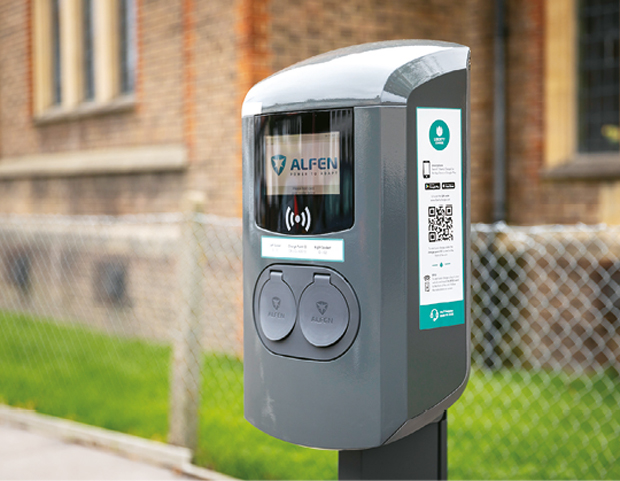Installing electric vehicles is daunting, say Dan Lessiter and Kevin Ledger, Senior Business Managers at Liberty Charge, but Charge Point Operators (CPOs) are there to support the introduction of an EV infrastructure
With the 2030 ban on new petrol and diesel vehicles fast approaching, and the demand for electric vehicles (EVs) increasing each year, a growing sense of urgency has been placed upon facilities managers to install EV charge points for both their own fleets and for customers and other stakeholders. So too has pressure increased to support Government-led sustainability goals for Clean Air and sustainable transport.
It’s widely reported that there is a lack of publicly accessible charge points across the UK. In every commercial environment, and especially in retail, hospitality, education and healthcare, facilities managers have the unenviable task of specifying and installing EV charging infrastructure at a pace that meets demand. Allocating funding, management and resources to plan, install, maintain and mitigate future risk poses significant challenges for facilities managers to overcome.
To that end, EV infrastructure must be reliable, cost-effective, accessible and sustainable, if business stakeholders are to be convinced of the benefits. And the arguments for investment are compelling across multiple sectors, from the opportunity to increase revenue and improve the customer experience through to enhanced support for ESG (Environmental, Social and Governance) policies.
SUSTAINABILITY GOALS AND SCOPE 3 EMISSIONS
Investing in EV infrastructure is an effecting way to offset Scope 3 emissions and address sustainability, net zero and ESG policies, quotas and regulations.
If your business has started this process, you will already be familiar with ‘scope emissions’ and how your business can control or reduce them. Scopes 1 and 2 refer to emissions owned or controlled by a company, through purchasing or dispelling energy. But Scope 3 emissions refer to business activity, and the indirect consequences that it, or its associated value chain, has on the environment.
It is the responsibility of businesses and facilities managers to assess how they can reduce their emissions through employee, customer and business activity. EV infrastructure and facilitating the use of more sustainable modes of transport can significantly reduce emissions relating to business travel, employee commutes, visitor transportation and distribution of business goods and services.
Across the board, there is a need to reduce CO2 emissions, and a key part of a CPO’s service is helping businesses to convince stakeholders of the environmental importance in helping customers and staff to travel sustainably, meeting ESG quotas and regulations and influencing consumer behaviour to reflect global environmental responsibility.
Overall, investing in EV fleets can be a way to further consolidate a business’ move towards sustainability and significantly decrease their indirect emissions.
FINANCIAL IMPLICATIONS OF EV INFRASTRUCTURE
While sustainability quotas and ESG policies are generally driving EV infrastructure investment, an added benefit – at least in specific sectors such as retail and hospitality – can be attracting new customers, furthering loyalty and increasing footfall and dwell times – and the consequent revenues that EV charge points can generate.
However, the perceived hurdle toward accessing these added revenue streams is the initial running costs of hosting EV charging infrastructure. For businesses struggling to implement an EV strategy, or looking to identify profitable, sustainable opportunities EV CPOs are available to support FMs who simply do not have the funds, time, or the experience to effectively plan, install and maintain EV charging networks and need support to achieve success.
The model is based on providing a fully-funded, ‘always-on’ solution to businesses, that only survives by ensuring charge points are always operational and used as much as possible, and therefore inherently mitigates downtime. This makes it a priority to identify the right locations and speeds for each use with competitive pricing to increase business footfall and dwell time for customers while they shop. This creates an added profit opportunity and revenue stream for businesses and facilities in the same process.
This ethos is evidenced for example by our charge point uptime of 99.3 per cent, which means that we can provide businesses with the confidence that their charge points are reliable and cause facilities managers no unnecessary hassle. And this comes with no capital or operational expenditure from the business at all.
END-TO-END SUPPORT
Delivering an appropriate EV charging infrastructure is a comparatively recent challenge for facilities and fleet managers.
Experienced CPOs understand the specific needs of each business. Whether a site requires new grid infrastructure, a plan for delivering the right charge speeds in the right locations, funding or a full risk assessment of the project at hand, they can support facilities managers to take care of these issues and deliver an optimised and efficient charging solution, designed with the customer in mind.
Many businesses and facilities managers are time-poor, which is why CPOs hold the keys here for infrastructure success. By working with a CPO, FMs and businesses can benefit from charge point sites being identified, installed and maintained for the purpose of meeting EV demand in a reliable and effective way.
Dan Lessiter and Kevin Ledger







